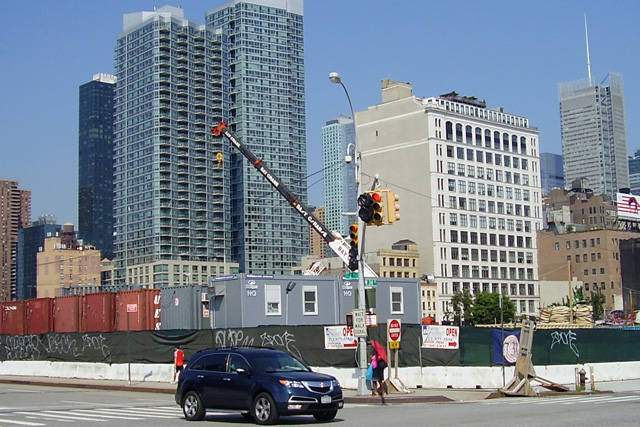NYC and the 2012 Olympics: What Would’ve Happened?
By Lennin Reyes
Friends Josie Castañeda, 34, and Erica Knicely, 24, run to pay their fare and collect the receipt to board the eastbound M34 Select Bus Service on the corner of 11th Avenue and 34th Street. While the bus stop might look like it is in the middle of nowhere, busy activity surrounds it as the sound of cranes fill the air celebrating the construction of new housing and the ongoing renovation of the Jacob Javits Convention Center.
In the midst of the construction, a train yard for the Long Island Rail Road called the Hudson Yards stands behind the bus stop. While it doesn’t have as much purpose, save for storing trains resting after long trips to/from Long Island, these yards evoke a specific memory when three words are mentioned to Castañeda, Knicely and other commuters on the eastbound M34 bus. The minute they hear the term “West Side Stadium,” their imaginations and nostalgia light up, as they think about the stadium and its role in New York City’s failed bid to host the 2012 Olympics, which commence Friday, July 27 from London.
As the games of the 30th Olympiad open, New Yorkers ponder how the two-week worldwide sporting extravaganza would have impacted their everyday lives. “I would be leaving New York for right now,” Knicely said, referring to what would have been her plan to escape the Olympic madness.
One person who was actually leaving New York City was Eddie Seda, 29, who held on to his luggage while riding a crowded 42nd Street Shuttle en route to the Port Authority Bus Terminal to catch a bus that would whisk him to Newark Airport, where he would then catch a flight to Japan. “I would have not made it out of New York [if it were for the Olympics],” Seda said. “It’s bad enough to already be a target.”
The Summer Olympics are known to catapult host cities into world-class status, something Knicely and Castañeda think is not needed as they ride the M34 into Midtown. “New York is on top of their game,” the two friends thought. “It doesn’t get any better than this.”
While some cities benefited from the exposure, others are only continuing to deal with its after-effects. For instance, the additional $11 billion spent in rushing projects for the 2004 Olympics in Athens, Greece began a chain of over-spending for the nation, thus contributing to their current debt. “Debt? What debt?” Denise Wright, 49, who lives near Yankee Stadium, said. “New York even makes money with the Puerto Rican Parade and the Feast of San Gennaro, which aren’t even for tourists.”
While New Yorkers did not worry about the prospect of a debt when asked about the possible scenario of a 2012 Olympics in the city, they did worry about the shift in money being dedicated to non-Olympic priorities. “There needs to be more emphasis on inner-city issues, such as education and poverty,” Nicole Adams, 21, said. One of those issues, job creation, is something Bronxite Ana Abreu, 28, thought the Olympics would have resolved. “There would have been more jobs for New Yorkers, along with more business for the hotels,” she said.
While the Olympics would have helped New York’s employment line, Castañeda and Knicely thought about some of the areas hosting the Olympic events. “New York doesn’t have too much space,” Castañeda said. “Atlanta had more space in building their venues,” referring to that city’s job in hosting the 1996 games. Some of the sporting events would have taken place in nearby New Jersey, as opposed to hosting everything within the five boroughs.
Space would have played a big role in the Olympics themselves. Organizers thought 70 percent of the athletes and tourists would have arrived to their events on public transportation. New Yorkers riding crowded buses and subway cars in the height of the afternoon rush hour thought it would strain the system. “This train would have been more crowded,” said Forest Hills resident Patrick Hu, 21, while riding a No. 5 train that had a few seats, uncharacteristic for being on the busiest trunk line in New York. Hu and others said the thought all trains would transform into sardine cans if the Olympics were in New York.
As the Olympics are set to begin in London, New Yorkers have mixed feelings on how the city would be if they had won the 2012 Olympic bid. While some would enjoy the business and the sight of athletes riding the subway to their events, others worry about the increased security, the increased hassle just to get somewhere, and the diverted emphasis from local issues toward the sporting event. As Castañeda and Knicely reach their stop at 7th Avenue and 34th Street, the sight of the crowds around Penn Station make them glad New York did not win the Olympic bid.



